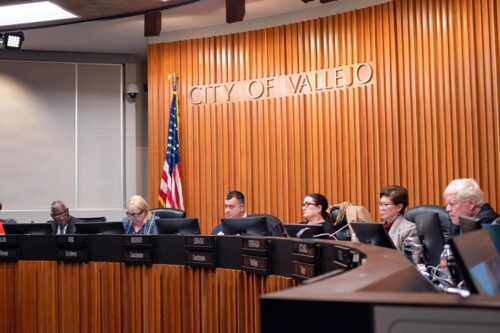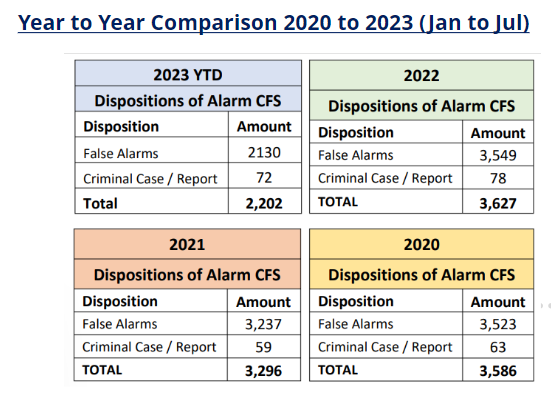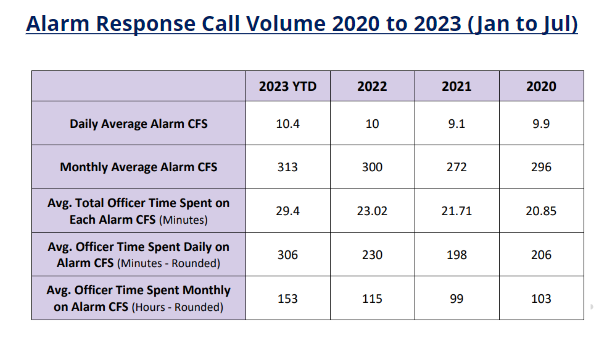
2.14.24 – Vallejo Sun – VALLEJO
Interim Vallejo police Chief Jason Ta acknowledged that there is a risk that officers may not respond to an actual crime taking place when the only notification is an unverified alarm.
The Vallejo City Council directed city staff on Tuesday to draft changes to city law that will limit police response to only ‘verified’ security system alarm calls.
Interim Police Jason Ta proposed at Tuesday night’s council meeting to model the amendments on an ordinance from the city of Fontana, which requires verification that a crime is in progress by an eyewitness, an alarm system video feed or by multiple alarm activations at a commercial complex or within a residence. The ordinance does not require verification for any alarm that is manually triggered, such as those designed for medical emergencies.
Ta acknowledged that there is a risk that officers may not respond to an actual crime taking place when the only notification is an unverified alarm, but said he feels that can be mitigated by educating residents and business owners about how to verify alarms and which systems offer forms of verification such as video or multiple trigger systems.
Ta said that he is familiar with the program because a similar ordinance was in place from 2011 to 2019 while he was working for the San Jose Police department.
When asked why the San Jose program ended, Ta said. “There were just too many break-ins.” Ta said that homeowners and businesses were unable to get insurance because insurance companies can reclassify a policy holder’s risk factor if they have had multiple break-ins.
Ta said that the proposed changes are designed to enhance public safety by more efficiently using the department’s limited staff. He said that a department study showed that from 2020 to 2022, the department received an average of 3,500 calls a year and 98% of those calls were determined to be false alarms. A study of alarm calls covering seven months in 2023 indicated a similar rate of 97% false alarms.

According to the studies, Ta said that officer hours spent on alarm calls went from 103 hours a month in 2020 to 153 hours a month in 2023. He said that the verification requirements would allow the department to divert 148 hours of officer time per month to other police responses.

The department proposed limiting alarm call responses to address declining staffing levels that prompted the city to declare a state of emergency in July. The department then held two public meetings on the proposed changes in which citizens expressed concern over the reductions in police services when many felt that police response to calls for service was already insufficient.
City Attorney Veronica Nebb recommended the city include a requirement to review the policy after at least one year of data is collected.
Ta said that a built in review period would have been helpful in monitoring the effectiveness of San Jose’s ordinance because “you can get diminishing returns after a while and you may have to adjust your strategy,” he said.
Vallejo resident Anne Carr made the only public comment on the proposed ordinance and echoed many of the statements made by members of the public during the public meetings.
“I’d like to see more effort on staffing before you say, ‘Oh well, we’ll just cut service.’ Because right now we don’t get the service anyway,” Carr said. “From what I experience as a resident, the police don’t respond even when they know there are crimes in process.”
Ta also provided the department’s bi-monthly staffing report on Tuesday, which the council requested as part of the emergency declaration.
In that report, Ta said that in a meeting on Feb. 5, Solano County Sheriff Tom Ferrara said that he could offer the support of 11 deputies, two sergeants and one lieutenant. The assistance would be citywide and would provide as much as 40 hours of support on the weekends, which are the department’s busiest shifts, Ta said.
The sheriff’s deputies would respond to high priority calls and patrol the city.
“Having this level of support is significant,” Ta said. “We could really deter some of the sex trafficking activity up and down the 29 corridor, we can deal rapidly with speeders, reckless drivers, side shows [as well as] burglaries and commercial break-ins.”
Councilmember Peter Bregenzer noted that the county board of supervisors would still need to approve the support from the sheriff’s office and he implored residents to contact their supervisor and urge them to approve the sheriff’s offer.
Human resources director Stephanie Sifuentes reported that from Jan. 31 to Feb. 8, the department received a total of 24 applications, including four lateral transfer applicants. Sifuentes said that the department has 23 officers currently undergoing the background check process, and 11 have been hired since the staffing emergency was declared in July. Nine of the new hires are recruits who have not yet graduated from the academy, she said.
Ta added that four officers who previously left the department have applied to return and they will undergo an abbreviated background process.
